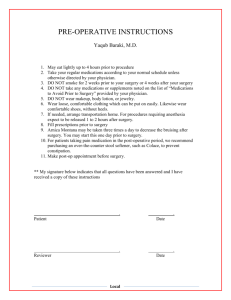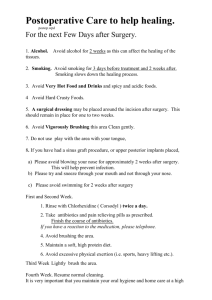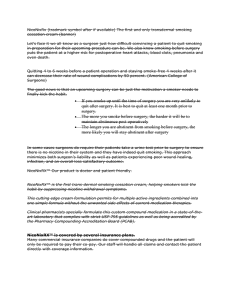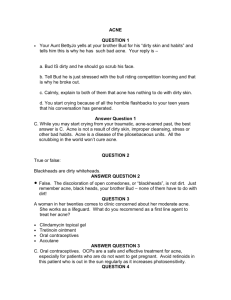Getting Ready for Your Surgery As you get ready for surgery, there
advertisement
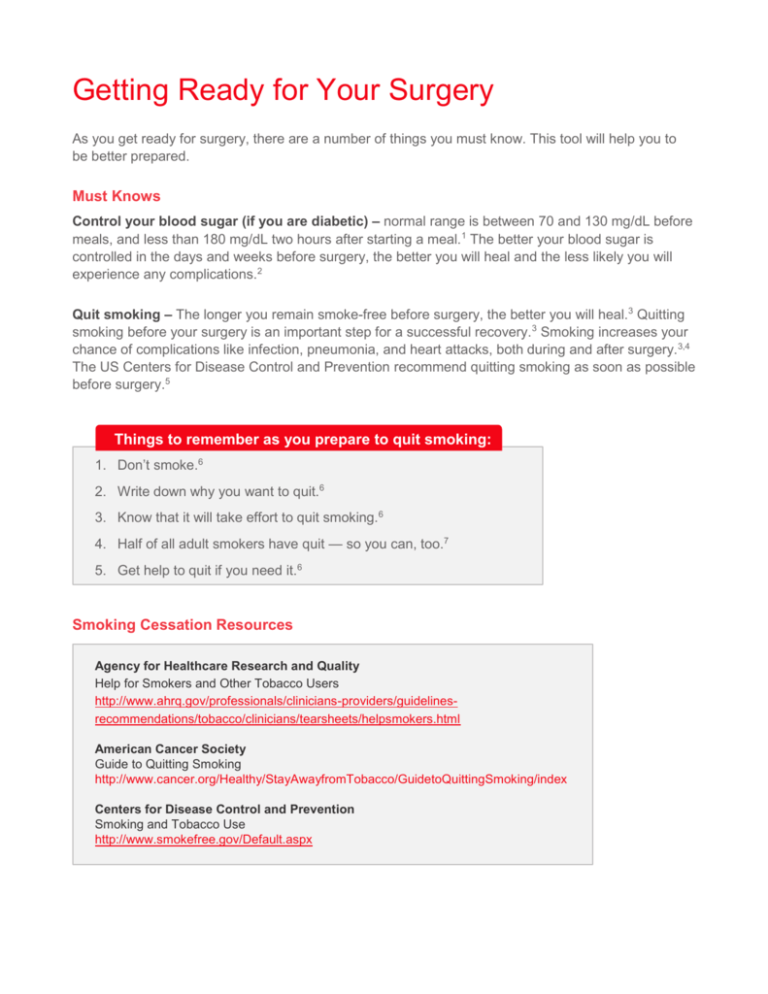
Getting Ready for Your Surgery As you get ready for surgery, there are a number of things you must know. This tool will help you to be better prepared. Must Knows Control your blood sugar (if you are diabetic) – normal range is between 70 and 130 mg/dL before meals, and less than 180 mg/dL two hours after starting a meal.1 The better your blood sugar is controlled in the days and weeks before surgery, the better you will heal and the less likely you will experience any complications.2 Quit smoking – The longer you remain smoke-free before surgery, the better you will heal.3 Quitting smoking before your surgery is an important step for a successful recovery. 3 Smoking increases your chance of complications like infection, pneumonia, and heart attacks, both during and after surgery. 3,4 The US Centers for Disease Control and Prevention recommend quitting smoking as soon as possible before surgery.5 Things to remember as you prepare to quit smoking: 1. Don’t smoke.6 2. Write down why you want to quit.6 3. Know that it will take effort to quit smoking.6 4. Half of all adult smokers have quit — so you can, too.7 5. Get help to quit if you need it.6 Smoking Cessation Resources Agency for Healthcare Research and Quality Help for Smokers and Other Tobacco Users http://www.ahrq.gov/professionals/clinicians-providers/guidelinesrecommendations/tobacco/clinicians/tearsheets/helpsmokers.html American Cancer Society Guide to Quitting Smoking http://www.cancer.org/Healthy/StayAwayfromTobacco/GuidetoQuittingSmoking/index Centers for Disease Control and Prevention Smoking and Tobacco Use http://www.smokefree.gov/Default.aspx Getting Ready for Your Surgery (continued) Know your medications – Know the names of your medications, the dose, and how often you take it.8 Make a list of all the medications you take including their brand and generic names, your dose, how often you take it, how you take it (eg, by mouth, patch, injection), and what condition you take it for.8 Be sure to include prescribed medications as well as over-the-counter medications, herbals, vitamins, and supplements.8 Know if you should take any of your medications before your surgery, even if you are told not to eat or drink anything.9 Ask your doctor. Ask your doctor – Ask if you should take any of your medications before surgery, even if you are told not to eat or drink anything.9 Ask your doctor. Use proper skin care10 Do not shave the area near where you are having surgery. Follow the showering instructions given by your physician before surgery and dry your skin after the shower with a clean, recently washed (not reused) towel. Do not apply lotion, powder, or perfume to your skin after your shower. References 1. American Diabetes Association. Tight diabetes control. Updated December 6, 2013. http://www.diabetes.org/living-with-diabetes/treatment-and-care/blood-glucose-control/tightdiabetes-control.html. Accessed September 15, 2014. 2. Loh-Trivedi M, Croley WC. Perioperative management of the diabetic patient. Updated June 10, 2013. Medscape Reference. Drugs, Diseases & Procedures. http://emedicine.medscape.com/article/284451-overview. Accessed September 15, 2014. 3. American Society of Anesthesiologists. Why should I recommend that my patients quit smoking for surgery? http://www.google.com/url?sa=t&rct=j&q=&esrc=s&source=web&cd=3&ved=0CCkQFjAC&url=http %3A%2F%2Fwww.asahq.org%2FFor-Members%2FClinicalInformation%2F~%2Fmedia%2FFor%2520Healthcare%2520Professionals%2Fdocuments%2FSt opSmokingProviderBrochure.ashx&ei=v0gXVMj9HYK2yATo54GoDg&usg=AFQjCNFmaAbYGksJ3kWSM56JCTIUcsUWQ. Accessed September 15, 2014. 4. Hawn MT, Houston TK, Campagna EJ, Graham LA, Singh J Bishop M, et al. The attributable risk of smoking on surgical complications. Ann Surg. 2011;254(6):914–920. 5. Gruendemann BJ, Mangum SS. Infection Prevention in Surgical Settings. Section One: Preoperative Preparation of Patients. Philadelphia, PA: W.B. Saunders Company; 2001. 6. Smokefree.gov. Have you built a quit plan? http://smokefree.gov/quit-plan. Accessed September 15, 2014. 7. American Lung Association. Trends in tobacco use. July 2011. http://www.lung.org/findingcures/our-research/trend-reports/Tobacco-Trend-Report.pdf. Accessed September 15, 2014. 8. Institute for Safe Medical Practices. Universal medication form. http://www.ismp.org/newsletters/consumer/alerts/ismp_med_form_pdf.pdf. Accessed September 8, 2014. 9. Hallisy JA. The empowered patient. Hospital guide for patients and families. Updated 2012. http://empoweredpatientcoalition.org/downloads/free/ebook_hospital_care_guide.pdf. Accessed September 8, 2014. 10. Burlingame B, Denholm B, Link T, Ogg MJ, Spruce L, Spry C, et al. Perioperative Standards and Recommended Practices for Inpatient and Ambulatory Settings. 2014 ed. Denver, CO: Association of periOperative Registered Nurses; 2014. © Johnson & Johnson Health Care Systems Inc. 2014 October 2014 017811-140701





